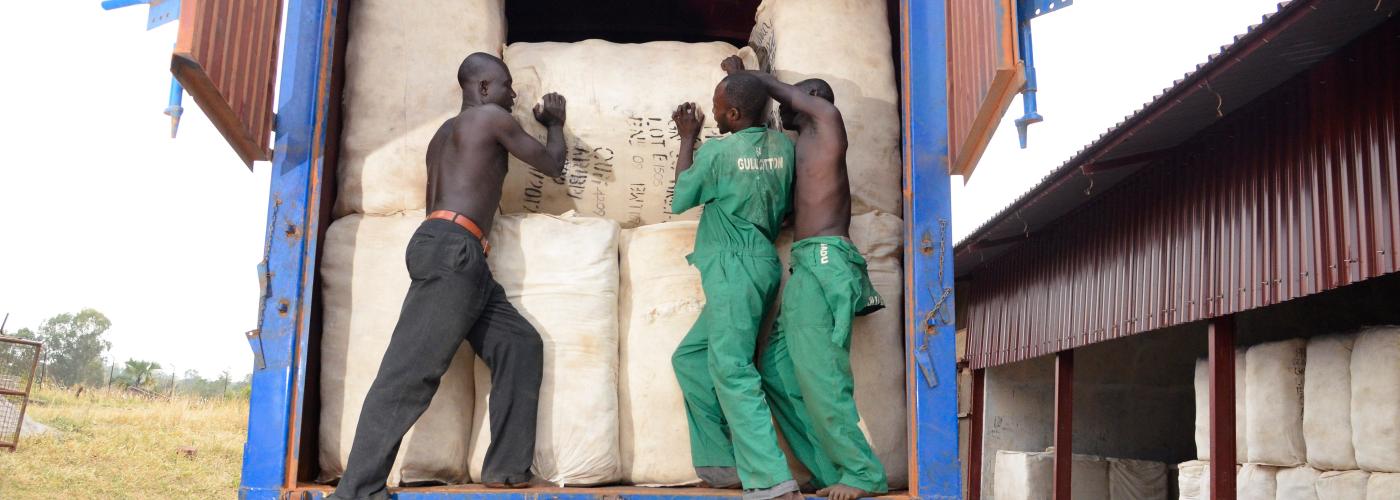Investing with a “Refugee Lens”: Private Capital Creates New Opportunities for Refugees
Image

As private foundations and investors take more interest in refugee services, we are seeing more innovative solutions and approaches for delivering services to refugee communities. The Smart Communities Coalition (SCC) brings the humanitarian and private sectors together to foster innovation in refugee settings, and at the SCC’s 5th Annual Meeting, one theme resonated: there is a strong economic case for refugees, who present a large untapped market as productive members of their host communities and would benefit from tailored services, not just humanitarian aid.
During the SCC’s fifth annual meeting in March 2022, attendees from private sector companies and humanitarian organizations—including USAID—heard from a variety of speakers on topics about providing services to refugee communities. One resonating theme: despite their situation, refugees are economic contributors and assistance should be based on development outcomes rather than just humanitarian need. Dr. Alexander Betts, Professor of Forced Migration and International Affairs at the University of Oxford, championed this approach during the Annual Meeting’s keynote, saying: “We see incredible signs of dynamism, vibrancy, people building extraordinary work in terms of small businesses, entrepreneurship, arts... and it's that dynamism, that innovation, that entrepreneurship, which gives hope that investing in refugee communities, and the leadership that already exists in those communities, is a way to move forward, beyond humanitarian encampment that we often see in such context.”
This theme was echoed in a panel session focused on innovations in funding for refugee communities. Panelists were from key investors, including Acumen, Developing World Markets (DWM), and Kiva, and a private sector donor, Western Union Foundation, who collectively invest in energy, financial services, up-skilling, and creating jobs for refugees and their host communities in Africa, the Middle East and Latin America with the goal of improving refugee livelihoods. This group was also joined by panelists from the Refugee Investment Network (RIN), the first impact investing and blended finance collaborative dedicated to creating durable solutions to forced migration.
Panelists discussed how private-sector funding and innovative approaches to address humanitarian challenges can take various forms. Most recently, private sector foundations have started to support efforts around innovation, with the venture, private equity funds, and company builders also entering the scene. “The expectation and hope are that serving refugees via [private] investment is going to become the model,” said Suma Swaminathan, Director, Private Equity at Developing World Markets.
Here are several of innovative approaches that panelists are developing to provide services to refugees and displaced populations worldwide:
- Acumen recently launched their first Accelerator for Ventures Serving Displaced People. Designed for entrepreneurs in East Africa, the 10-week program will support leaders seeking new solutions to serve refugees and promote self-reliance for displaced and crisis-affected people and their host communities. During the program—which is also open to refugees—participants will learn new leadership and business skills alongside their cohort, and develop their profitable and scalable business model with 1:1 mentorship from Acumen. The accelerator is part of the larger, year-long RIN/Acumen 'Refugee Lens Investing in the Greater Horn of Africa' project that aims to lay the foundation for Refugee Lens Investment (RLI) in the region.
- DWM, an emerging and frontier markets-focused impact investor, is launching the Displaced Communities Fund (DCF), as the first in a series of funds. The DCF aims to develop and demonstrate a market-based solution to scale and catalyze capital toward improving the self-reliance of forcibly displaced or migrant populations from Africa and theMiddle East to improve their self-reliance through investments in financial inclusion and job creation, with a focus on gender equity. The 10-year, $50-75 million fund is focused on bringing in capital from financial institutions and technology or operating companies, including mobile money and fintech, who are looking to expand their portfolios and product offerings to displaced or migrant populations.
- Similarly, Kiva’s Refugee Investment Fund (KRIF) is a 5-year fund totaling $32.5 million that closed in March 2021. KRIF’s goal is to mobilize investment dollars to scale lending to displaced populations in the Middle East, Latin America, and East Africa.
- Western Union Foundation, a private donor seeking to empower forcibly displaced and marginalized youth to gain access to 21st-century economic opportunities across the globe, has launched Opportunity Beyond Borders: a 3-year, $15 million pledge to reach 100,000+ migrants and provide an opportunity for youth. Western Union, one of the world’s largest cross-border money transmitters, has long believed in the value that migrants offer to both their host communities and friends and families back home.
- Panelists also shared tools and approaches that enable investment in refugees. For example, the Refugee Lens, developed by RIN, is an investing framework to qualify and track investments over time in response to the question: “What is a refugee investment?” Similarly, RIN’s Refugee Opportunity Index (ROI) evaluates government policies that impact refugees and acts as a data-driven tool to incentivize pro-refugee policy reform. It also helps to inform private sector companies looking to make investments in refugee communities and will be available in summer 2022.
Across all their efforts, panelists emphasized that public-private partnerships are critical and play a key role in helping to scale up innovations. The SCC exists to facilitate just such partnerships. The SCC and its members are looking for ways that traditional players can help contribute to this emerging space, such as by de-risking investments via guarantees, grants, or funding technical assistance and impact measurement. These innovative organizations are part of a growing movement known as “refugee-lens investing” that is building on the progress of other impact investing themes, like gender-lens investing. By creating sustainable, long-lasting strategies for private sector engagement, these investments are ultimately helping refugees find new economic and social opportunities and become more self-reliant in their host communities.
About the Author
Diana Boncheva Gooley is the Senior Digital Finance Advisor in the Technology Division of USAID's Innovation, Technology, and Research Hub and serves as SCC C0-Chair.
About the SCC
The Smart Communities Coalition (SCC), co-chaired by Mastercard and the United States Agency for International Development (USAID), acts as the bridge connecting humanitarian organizations and private sector companies, from startups to large corporations, in order to improve the delivery of services. The SCC seeks to mobilize collaboration by (1) networking and matchmaking, (2) financing, and (3) generating new models to enhance lives and livelihoods in refugee settings. We seek to enable innovative, sustainable approaches, creating hope and economic opportunity for the forcibly displaced and the communities that host them. Our stakeholders are organized according to their core strengths to address three fundamental pillars: energy, connectivity, and digital tools.


